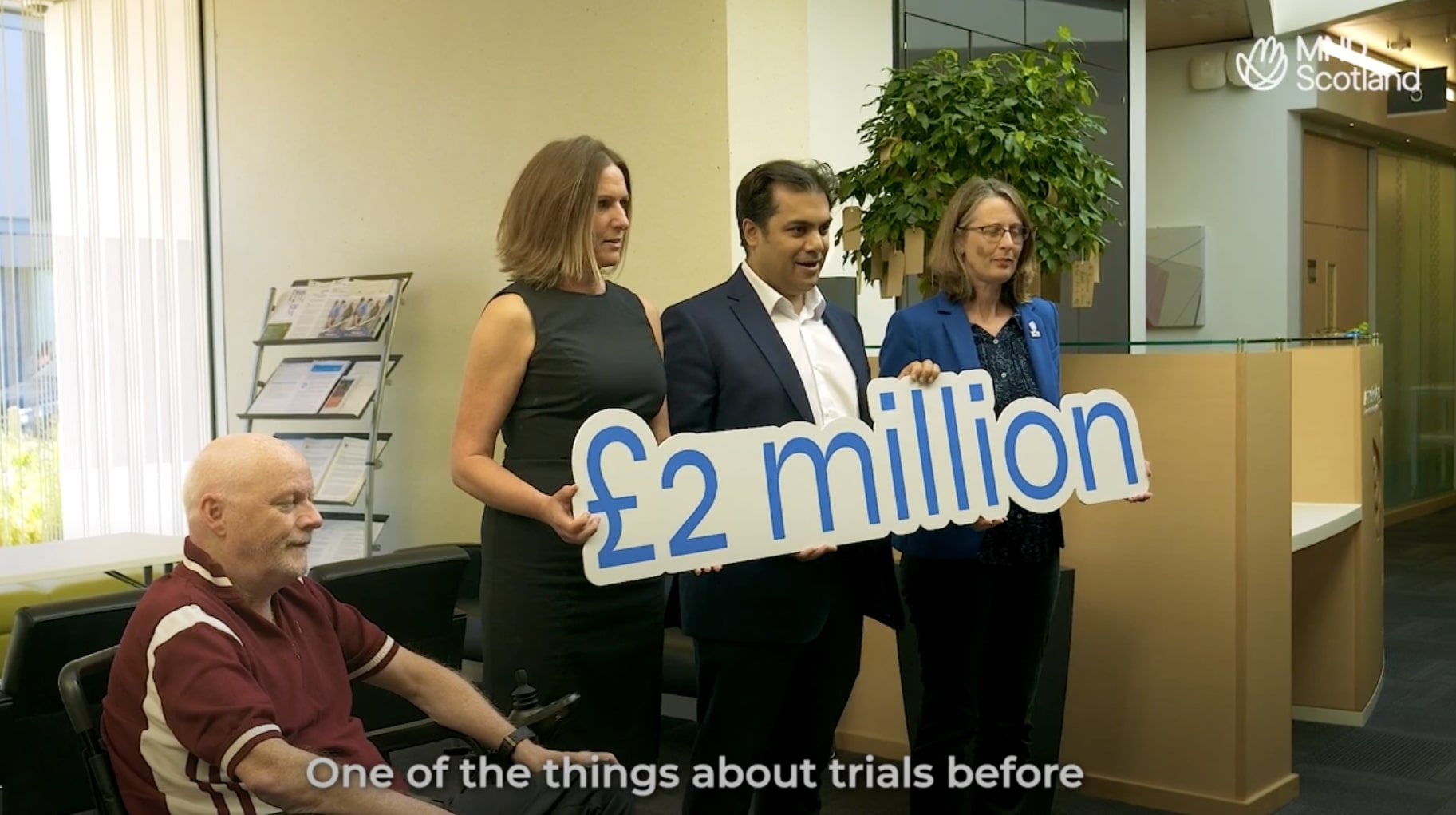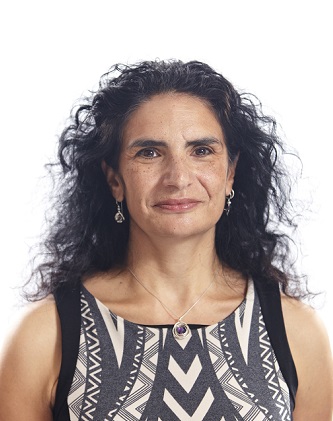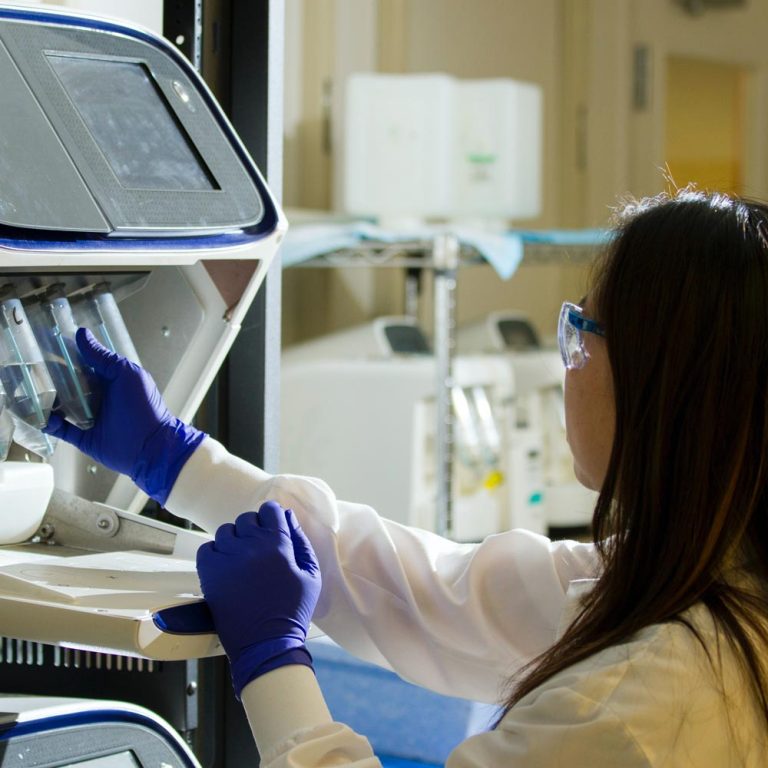Our funded research
Only by funding research can we change the future for people with MND.
Our funded projects
We’re targeting our investments to find new MND treatments and bring them into clinical trials as quickly and as safely as possible, as well as improving quality of care for people affected by MND. Currently we are supporting:
- 4 major research projects
- 4 PhD studentships
- 1 Clinical Fellowship
- The UK’s biggest ever MND clinical trial

to take potential treatments into people, including clinical trials
for therapies and mechanisms underlying MND
standards for people affected by MND
Our current projects
To find out more, download our PDF with more detail on our research strategy.
Treatment pipeline to take potential therapies into people
£1.5 million investment in 2018 to University of Edinburgh to establish the UK-wide MND-SMART clinical trial, plus a further £2 million awarded in 2023 to enable the trial to continue until 2028. In partnership with the MND Association, who are contributing an additional £0.5 million to bring the total 2023 investment to £2.5 million. Due to complete in 2028. Click here for more information.
£250,000 contribution to a £4.25 million program setting up a virtual UK MND Research Institute [link: https://ukmndri.org]. In partnership with LifeArc, MND Association and My Name’5 Doddie Foundation, Medical Research Council, and National Institute for Health and Care Research. Due to complete in 2025. Click here for more information.
£84,059 to Dr Tatyana Shelkovnikova, University of Sheffield, for creation of a cell model, for use in a therapeutic drug screen, to detect novel molecules that might prevent motor neuron loss by interacting with Stathmin-2. Due to complete in 2025. Click here for more information.
£30,000 to Professor Colin Smith, on top of an initial £21,000 award, University of Edinburgh, to enable to Edinburgh Brain and Tissue Bank to collect tissue from people in Scotland with MND. Due to complete in 2026. Click here for more information.
Identifying targets for therapies, and mechanisms underlying MND
£86,310 to Professor Kevin Talbot, University of Oxford, to understand the contribution of microglia to motor neuron death in MND. Due to complete in 2026. Click here for more information.
£125,000 (matched by the Chief Scientist Office of Scotland), to Kristine Roberts, from NHS Grampian and the University of Aberdeen, to seek new biomarkers of MND which could be used to detect the disease early, ideally before symptoms present. Due to complete in 2027. Click here for more information.
£92,717 to Dr Lyndsay Murray at the University of Edinburgh, to investigate the impact of certain drugs on regrowth of damaged neurons. Due to complete in 2027.
£224,805 to Professor Roger Whittaker, University of Newcastle, to investigate whether MRI scanning of motor units in people with MND can be developed as a diagnostic and progression biomarker for MND. Due to complete in 2027. Click here for more information.
£10,000 to Dr Natasha Fullerton, Dr George Gorrie and Prof David Porter, University of Glasgow, to investigate the use of powerful MRI scanners and an innovative MRI coil to identify diagnostic markers in the brain in MND. Due to complete in 2026. Click here for more information.
Improving standards of care and support for people affected by MND
£75,174.76 to Dr Alisdair McNeill, University of Sheffield, to understand whether relatives of people affected by a heritable form of MND are using the reproductive options available to them and understand the barriers to access. Due to complete in 2026. Click here for more information.
Together we’re making a difference
Every year our understanding of motor neuron disease gets better. Find out more about the research projects building our understanding of the mechanisms behind MND and the latest research news.

Support strategies could assist people living with MND in making decisions about their health.

MND Scotland and Scottish Government fund project to improve the delivery of environmental controls for people with MND

NICE assessment of tofersen to begin in 2026
How research is funded
Patient priorities drive and shape charity research so that funding gets directed to where it will make the most difference to people’s lives

Working together to beat MND
MND Scotland believes that strength is forged through partnership and we are actively engaging with our colleagues in MND charities worldwide, as well as universities, the Scottish Government and funding bodies, to help accelerate MND research.
Two major initiatives are:

UK MND Translational Research Institute
In 2022 we invested £250,000 into an exciting new MND collective partnership to establish the foundations of a UK-wide research institute aimed at speeding up the development of better treatments for people with MND. This £4.25 million initiative is led by the charity LifeArc, in partnership with MND Association, My Name’5 Doddie Foundation and MND Scotland, as well as government funders the Medical Research Council (MRC) and the National Institute for Health Research (NIHR).

United to End MND
Led by people living with MND, this high-impact campaign brought together MND charities across the UK, including MND Scotland, to campaign for improved investment in MND research from the UK Government. In November 2021 we succeeded in securing a pledge of £50 million over five years. The expectation is that this funding will build on, and further develop, the UK wide MND Research Institute.
How drugs are developed for motor neuron disease
Making drugs available to people can be a lengthy and complex process. MND Scotland, with support from Costello Medical, have developed these infographics in collaboration with the MND Association and My Name’5 Doddie Foundation to explain the different steps of the process.
You can download these infographics by clicking the buttons below.
Together we’re making a difference
Since 1998 support for MND Scotland has enabled us to fund:
MND SMART
The UK’s biggest ever MND clinical drug trial was enabled in 2018 following a £1.5 million investment by the MND Scotland. The trial launched in 2020 and, for most people living with MND across Scotland, access to the trial provided the first opportunity for them to be involved in testing potential new treatments for motor neuron disease.
In 2023 we announced a further £2 million of funding so that MND-SMART can continue to operate for an additional five years, providing a clinical trial infrastructure that is ready to quickly test potential new treatments identified by researchers.
CARE-MND
MND Scotland funding established the first MND patient registry in the world in 1989. Between 2010 and 2019, we invested over £500,000 to develop this into the online CARE-MND nationwide MND register which provides both comprehensive monitoring of patients and a mechanism for people with MND to participate in research. (99% of people with MND in Scotland are registered with CARE-MND) CARE-MND is recognized as a ‘gold-standard’ world-leading, MND patient registry.
Edinburgh Brain and Tissue Bank
Since 2008 MND Scotland has recognised the value to researchers of a dedicated MND brain and tissue ‘bank’, funding the establishment this valuable facility. It is the only brain bank in Scotland and tissue generously donated by people with MND is made available to researchers in the UK, and around the world, who are working towards finding a cure for MND.
MND Scotland continues to support this MND Brain bank, which is linked to the CARE-MND platform and, as a result, is considered to be a world-leading resource.
Turning the Tide
Innovative research is happening throughout the UK and we are supporting colleagues working in the wider MND field. One example is the work at UCL Queen Square Institute of Neurology on research for a new gene therapy that could be used to treat patients with MND.
In 2021, researchers worked out that a major cause of damage to motor neuron cells was the loss of a protein called UNC13A, which helps nerve cells pass messages to each other.
This short film explores the progress in research for a new gene therapy that could be used to treat patients with MND.
With thanks to Quickfire Media Limited for permission to share this video.
For researchers
Are you an MND researcher? You can help us create a world without MND and improve the lives of those living with the illness today.
Find out more about our funding applications and how you can help make time count.
You can help create a world without MND